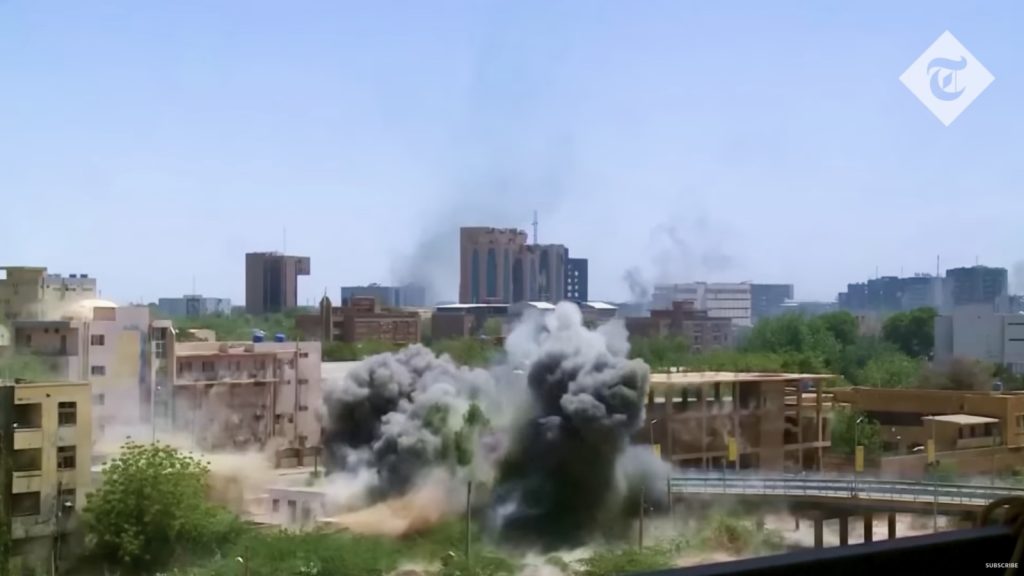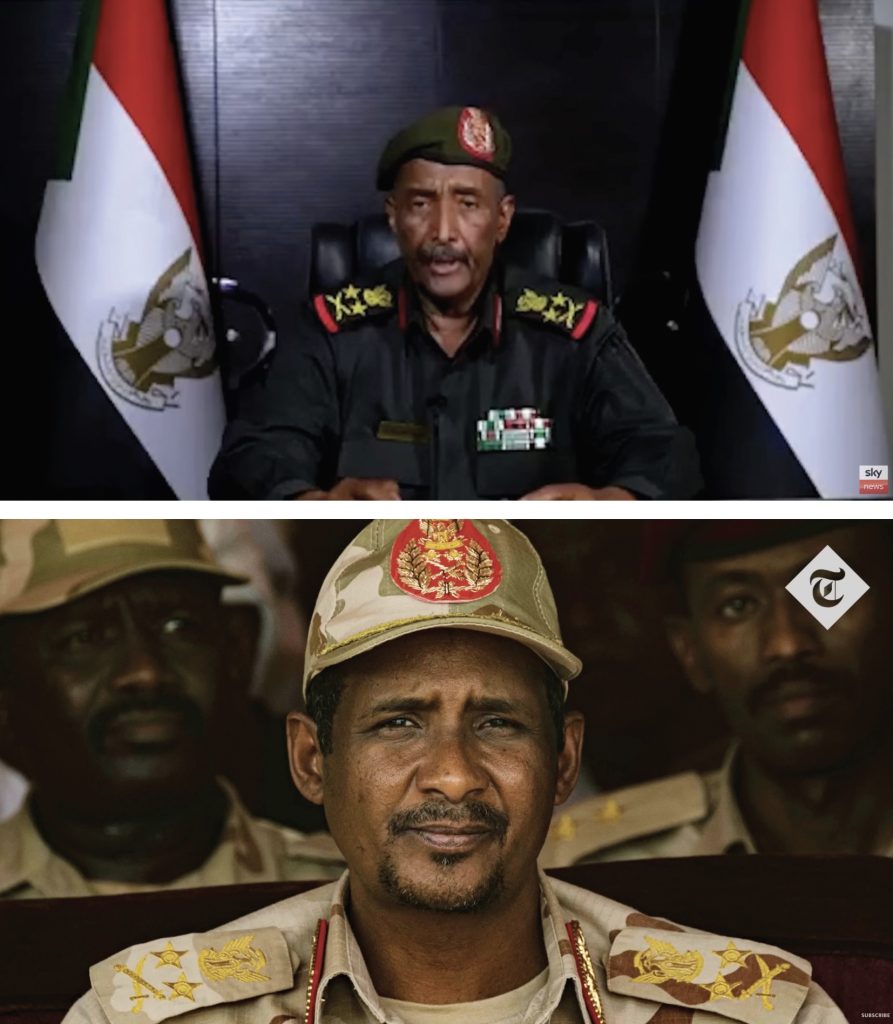Australia/Israel Review
Sudan’s Civil War endangers peace hopes
May 4, 2023 | Ehud Yaari

When fighting broke out between rival generals in Sudan in April, one of its many ripple effects was the potential upending of understandings reached with Israel. Previously, the two countries had been on a path to signing a comprehensive peace agreement sometime later this year in Washington, to be followed by the exchange of ambassadors and the conclusion of protocols for cooperation in various fields – from developing Sudan’s vast agricultural potential to upgrading its health services and initiating trade relations.
This process represented the culmination of declarations and agreements reached in 2020-21- regarding normalisation between the two countries and Sudan’s participation in the Abraham Accords. The United States played a major role in those efforts by rescinding Sudan’s designation as a state sponsor of terrorism, lifting the associated sanctions, and extending financial aid.
According to Israeli officials, the final text of the peace agreement was drafted months ago, with input from Washington and informally approved during Foreign Minister Eli Cohen’s February visit to Khartoum. A formal signing was predicated on several preliminary steps: completing US and international mediation between the military and the loose coalition of factions called the “Forces of Freedom and Change” (FFC), forming an interim civilian government in Khartoum, and holding general elections, after which the new parliament would ratify the agreement with Israel.
The US has long seen democratisation in Sudan as a key objective, in part to help ease Khartoum’s tensions with neighbouring countries and protect the vital Red Sea corridor.
On December 5, a “Framework Agreement” was reached to resolve the protracted tensions between the regular army and the Rapid Support Forces (RSF), a powerful paramilitary that emerged from years of bloody conflict in Darfur and which had previously partnered with the army in ousting dictator Omar al-Bashir in 2019. This framework envisions a two-year transition to civilian rule and the RSF’s merger into the army. Yet the commander of the RSF, Gen. Mohamed Hamdan “Hemedti” Dagalo, has insisted that this merger be extended to ten years, incensing Gen. Abdel Fattah al-Burhan, the army chief who heads the transitional Sovereignty Council.

Former allies turned rivals Gen. Abdel Fattah al-Burhan (top) and RSF leader Gen. Mohamed Hamdan “Hemedti” Dagalo (Screenshots)
These tensions led to the outbreak of hostilities in the capital and various towns and bases in the provinces. The army is backed by reconstituted Islamist factions that formed the core of Bashir’s regime, while Hemedti is rumoured to enjoy tacit support from National Umma Party leader Mariam al-Mahdi, who is suspected of trying to break the army-RSF partnership in the hope of accelerating the transfer of power to a civilian coalition led by herself. Many of Hemedti’s troops are also followers of the Mahdiyya movement, which harkens back to the Islamic state that Mahdi’s ancestor established in Sudan in the late nineteenth century.
Notably, the Islamists have taken a clear stand against peace with Israel, as have many FFC member parties (e.g., the communists and Baathists).
Israel’s cautious role in Sudan
Israel’s past and present approaches to Sudan have been complicated by a host of factors. During the current normalisation era, Israeli authorities have failed to cultivate relations with Sudanese civilian parties, focusing entirely on Burhan, his subordinate officers, and, to a lesser extent, the RSF. Over three successive governments in Jerusalem, no serious effort was undertaken to show the Sudanese people the potential benefits of normalisation.
A handful of Sudanese civilian delegations have visited Israel, but these quiet, infrequent trips are dwarfed in number by the high-ranking military delegations that have arrived on semi-secret missions to seek assistance.
This imbalance has exacerbated the wide opposition to normalisation among Sudanese political elites, many of whom believe that Israel has been providing intelligence and cyber tools to the military in order to quell recent protests. In fact, Israel has carefully screened such military requests and refused or deferred the bulk of them in consultation with Washington.
For instance, when Hemedti sent his brother Gen. Abd al-Rahim Dagalo and his political advisor Yusuf Izzat to present his long wish lists on multiple occasions, Israeli officials were apparently unwilling to play any role in Sudan’s domestic strife – especially given that Hemedti has been repeatedly accused of ordering massacres in Darfur when he headed the Janjaweed militia. Qatari-financed media have spread rumours that the General is getting help from Israel’s Mossad, but such accusations may be a product of Doha’s long-running rivalry with the United Arab Emirates, which has ties to Hemedti.
Israel’s cautious approach is based on experience acquired over seven decades of intermittent involvement in Sudan. In the 1950s, the late Sadeq al-Mahdi (Mariam’s father) sought Israeli help in his struggle against Egypt’s Gamal Abdul Nasser.
This engagement flourished with President Jaafar Nimeiri in the 1970s and ’80s, albeit in a strictly clandestine manner. Nimeiri cooperated in the effort to bring Ethiopian Jews to Israel and allowed the Mossad to maintain a presence in Khartoum. The relationship later deteriorated after Bashir took power, inched closer to Iran, and began facilitating arms shipments to Hamas in the Gaza Strip. By 2016, however, Bashir had distanced himself from Teheran, and secret contacts with Israel resumed. Burhan served as chief of military intelligence during this time.
Israel’s interest in Sudan has also been driven in part by PM Binyamin Netanyahu’s longstanding desire to open a direct flight route to Latin America in order to boost economic relations. A permit to overfly Sudan, complemented by similar arrangements with Chad, is still one of his primary foreign policy targets.
Conclusion
The two-and-a-half-year delay in converting the normalisation declaration into a signed peace agreement appears to have put the entire process at risk. Even if Sudan forms a civilian government in the near term, it may prove reluctant to test the public mood by concluding a treaty with the “Zionist enemy”, as Israel is often referred to by the local press. If Burhan wins his contest with Hemedti, his Islamist allies may convince him to suspend or at least slowdown normalisation; similarly, if Hemedti prevails, he will have to factor in how the National Umma Party and other potential partners feel about Israel.
Keeping Sudan in the Abraham Accords may therefore require the United States to insist that Khartoum fulfil its commitments and complete the peace agreement – perhaps even by warning the country that it stands to lose the US benefits granted in conjunction with the initial normalisation declaration. Most of Sudan’s civilian factions do not want to forfeit American support.
Other countries could help preserve the process as well. The UAE wields significant influence in Khartoum, as does Egypt, which maintains a limited military presence. Saudi Arabia and neighbouring Chad could likewise steer the next civilian government away from leaving the peace track paved by Sudan’s generals.






